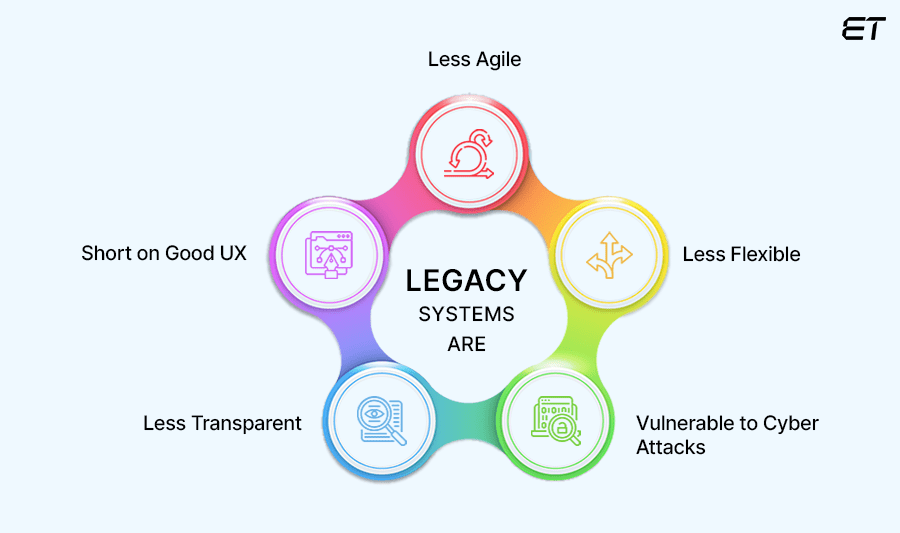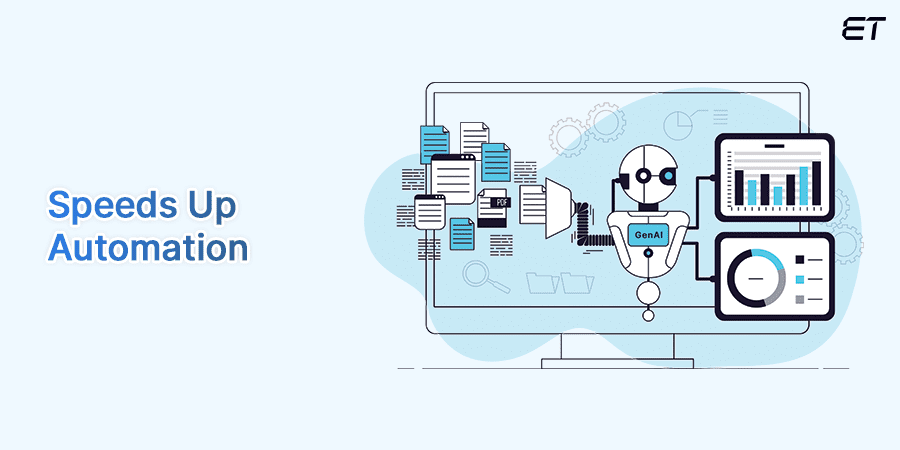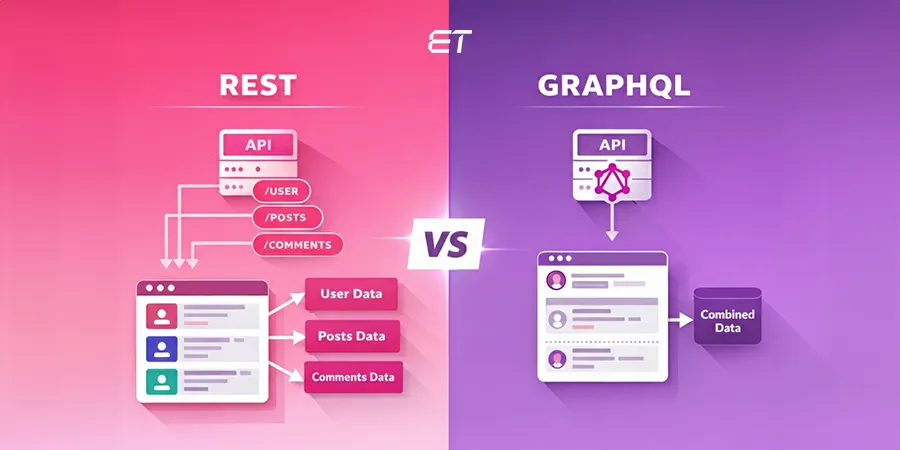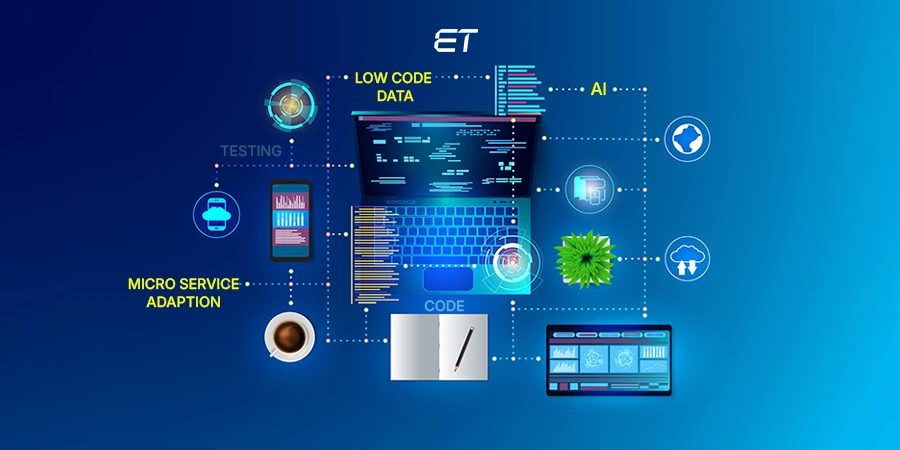
How GenAI Can Help Modernize Legacy Systems?
Visualize this scene – a sleek, futuristic robot stares down a dusty, outdated video cassette recorder (VCR). Sounds like a bizarre movie pitch, right?
Well, it does, but it perfectly captures the struggle between cutting-edge technology and our conventional legacy systems.
These legacy systems, the video cassette recorders of the corporate world, hold vital information and processes. Still, their boring interfaces and outdated infrastructure hold businesses back. So, if you relate to this, you must be thinking – ‘is there a solution to overcome this tech stagnation?
Indeed, yes! The solution is generative AI (GenAI).
In this blog, we will elaborate on the vulnerabilities of legacy systems and explore the tell-tale signs that need a makeover. We will also explain how GenAI can save your legacy systems from becoming mundane, outdated digital products.
What Do Legacy Systems Lack?

Our trusty legacy systems are the central hubs of critical data and core processes. But just like any ageing technology, they can develop chinks in their armour.
So, as a business, it is crucial to identify the tell-tale signs that your legacy systems fall short. Consider the following points.
Agility and Flexibility
Legacy systems are conventional technologies (in most cases). Their rigid structures struggle to adapt to the ever-changing needs of the modern business landscape.
The challenge is that integrating new technologies or implementing innovative processes can be slow.
Security Vulnerability
What do most legacy systems have?
Outdated code and sloppy security protocols.
These facets make legacy systems prime targets for cyber attacks. Hackers exploit these vulnerabilities to steal sensitive data or disrupt operations, putting your company at financial and reputational risk.

Need personalized assistance to understand the scope of AI services? Contact us today!
User Experience (UX)
No points for guessing, right?
Legacy systems usually have outdated and unintuitive user interfaces that frustrate employees. In today’s world, you must match the impact of sleek mobile apps and user-friendly platforms.
Scalability and Efficiency
As your business grows, your legacy system may struggle to keep up with the pace of advancement. Scaling these systems can be expensive and complex.
So, you must find modern technologies (like GenAI) to find a perfect solution.
Does Your Legacy System Need Modernization?
You might be a Chief Technology Officer (CTO) at a reputed corporation or a technical professional passionate about your job.
Regardless of your profile, it is vital to identify when your legacy system needs a complete revamp. So, without any ado, look for these evident signs.
1. Integration Issues

As a decision-maker, you should address the following queries:
- Does your system struggle to connect with modern applications and tools?
- Are your teams spending more time struggling with data migration than focusing on strategic initiatives?
These integration problems are a sign that your legacy system is hampering collaboration.
2. Maintenance Hurdles

Ask yourself these practical questions:
- Is your IT department constantly patching vulnerabilities to keep your legacy system operational?
- Are the developers familiar with your system’s obscure codebase and consider it a complex source?
These maintenance hurdles demand legacy system modernization that improves code readability, reduces technical debt, and frees up your IT team for more strategic tasks.
3. Performance Limitations

Since we are understanding these signs with the help of practical questions, here are some more:
- Are your users complaining about your legacy system’s slow loading times and sluggish responsiveness?
- Does this lag impact productivity and customer satisfaction?
If the answer is yes, it implies your legacy system is struggling to keep pace with your business demands. So, GenAI modernization can bring agility and scalability, ensuring your system runs smoothly even as your workload grows.
4. Security Concerns

Here are some more questions to contemplate about:
- Do you worry about the security vulnerabilities lurking in your legacy system’s outdated code?
- Does your team constantly think about consulting cybersecurity experts?
If these concerns are legitimate, you need to understand one vital truth. Legacy systems are prime targets for cyber-attacks and can put your business at risk of data breaches and financial losses.
The solution? Modernization with GenAI can help identify and address security gaps, fortifying your system.
How Generative AI is the Perfect Solution?
Now comes the part you might be most eager about. How can GenAI be the best option to modernize your legacy system?
Well, allow us to elaborate on some of the main pointers.
GenAI Untangles Your Code Issues

Let us face it – legacy systems have complex codebases. But GenAI can decipher these codes profoundly.
Here are some ways how GenAI modernizes your legacy system code:
- Automated Code Analysis: Generative AI utilizes advanced algorithms to analyze the structure and syntax of your legacy system code. It can identify patterns, dependencies, and hidden functionalities, even within code written in archaic programming languages
- Reverse Engineering and Documentation Generation: GenAI can reverse engineer the code and generate documentation that explains what different parts of the code do. This documentation becomes invaluable for developers who need to understand the system before making modifications
- Understanding Data Flow: Legacy systems have complex data flows and dependencies between different code modules. GenAI can map these data flows to create a visual representation of how information travels within the system
With these techniques, GenAI empowers developers to navigate the system confidently, reduces errors during modernization, and facilitates smoother and more successful upgrades.

Interested in knowing more about generative AI? Read our blog on Generative AI vs Predictive AI to understand some crucial pointers.
GenAI Helps with UI Design

Legacy systems have outdated user interfaces (generally). This visual drawback can lower the engagement of your target user.
So, how does GenAI help? Consider the following points:
- User Journey Analysis: GenAI can analyze user interactions, clicks, and workflows to understand how users engage with the system. This user journey analysis exposes pain points and identifies areas for improvement
- Designing for Modern User Expectations: Modern users prioritize user-friendly interfaces with clear navigation, intuitive interactions, and a focus on efficiency. GenAI can analyze current design trends and suggest UI improvements that align with these expectations
- Code Snippet Generation for Modern UI Frameworks: Integrating a modern UI into your legacy system can be a technical hurdle. GenAI can bridge this gap by generating code snippets designed for popular UI frameworks like React or Angular
- A/B Testing: By utilizing GenAI, dedicated developers can facilitate A/B testing of different UI iterations. This tactic allows you to measure user engagement and identify the most effective design
Overall, GenAI analyzes user behaviour, suggests data-driven improvements, and generates the building blocks for a modern UI. This comprehensive approach ensures that your legacy system transformation results in an intuitive and efficient user experience.
GenAI Helps Tackle Security Concerns

As we mentioned earlier, legacy systems are prone to cyber-attacks. However, the right modernization approach using GenAI can work wonders.
Here are some practical ways of using generative AI to address security vulnerabilities:
- Vulnerability Detection: GenAI scans your code for vulnerabilities and potential security weaknesses. It analyzes patterns and compares them to databases of known exploits, identifying areas of concern
- Prioritization Strategies: Generative AI can prioritize weaknesses based on their severity and potential impact. So, your technical security team can focus on the most critical issues first, efficiently allocating resources for remediation efforts. Furthermore, GenAI can also suggest potential fixes or mitigation strategies, providing a roadmap for patching these vulnerabilities and bolstering your system’s defences
- Secure Code Pattern Generation: Generative AI can analyze secure coding practices and generate code snippets, reducing the risk of introducing new vulnerabilities during the modernization process
- Continuous Threat Monitoring: GenAI monitors your system for suspicious activity and potential attacks. Generative AI can alert your security team to potential breaches by analyzing system logs and network traffic.
In essence, GenAI helps you to build a robust security shield around your legacy systems, protecting your data.

Want to build a robust security architecture for your legacy system? Don’t wait. Contact us now!
GenAI Automates Legacy Modernization

You might agree that modernizing legacy systems is a time-consuming and complex process. However, artificial intelligence can help.
Without any ado, understand how GenAI can help in the automation aspect:
- Automating Code Refactoring: In simple terms, refactoring is the process of restructuring computer code without changing its functionality. GenAI can automate this refactoring process. It can identify opportunities to simplify complex logic, remove dead code, and improve code readability
- Streamlining Data Migration: Migrating data from a legacy system to a modern platform can be monumental. GenAI can automate this process by mapping data structures between the old and new systems. It can handle data conversion, ensuring data integrity and minimizing downtime during the migration
- Automating System Configuration Management: Legacy systems have complex configurations that need meticulous maintenance during the upgrade process. So, GenAI can automate this configuration management, ensuring consistency across different environments
- Continuous Integration and Delivery (CI/CD) Pipeline Optimization: Modernization projects involve frequent code updates and deployments. GenAI can help optimize your CI/CD pipeline by automating tasks like code building, testing, and deployment
Overall, GenAI can help your development team focus on higher-level strategic initiatives by automating these tasks. This automation will minimize the risk of errors and ensure a more efficient and predictable upgrade process.
Summing Up
Legacy systems are essential but outdated. They lack the agility, security, and user-friendliness to thrive in today’s competitive landscape. The solution?
You need to upgrade these systems with generative AI.
In a nutshell, GenAI can help you:
- Understand your legacy system’s functionalities and dependencies
- Refactor code for improved performance and maintainability
- Migrate data seamlessly to modern platforms
- Enhance user experience with intuitive and efficient interfaces
- Bolster security against cyberattacks
Overall, GenAI offers a potential solution for modernizing your legacy systems. However, you need to implement this technology systematically. So, choose AI software development services to help modernize your systems easily!
Frequently Asked Questions
1. What are the biggest challenges of legacy system modernization, and how can GenAI help?
Legacy systems suffer from poor documentation, outdated code, and security vulnerabilities. GenAI can assist by automatically generating documentation, refactoring code for improved efficiency, and identifying potential security risks.
2. How does GenAI improve the user experience (UX) of legacy systems?
GenAI can analyze user interactions with a legacy system and suggest interface and user flow improvements. It can also generate code snippets for modern design frameworks to create a fresh, user-friendly experience.
3. My legacy system is critical to my business, but I’m worried about downtime during modernization. Can GenAI help minimize disruption?
GenAI can automate data migration and integration tasks, ensuring a smoother transition to a modern system. This facet can help reduce downtime and keep your business operations running efficiently.
4. Is GenAI too expensive for small and medium businesses (SMBs)?
The cost of GenAI for legacy system modernization is constantly decreasing as the technology matures. Exploring cloud-based GenAI solutions can be a cost-effective option for SMBs looking to leverage the benefits of this technology.





